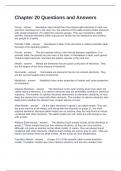-
1. Exam (elaborations) - Ifpc- questions & answers correct
-
2. Exam (elaborations) - Force protection modele 4 questions and answers
-
3. Exam (elaborations) - Pw1100g-jm (fuel & actuation) questions and answers correct
-
4. Exam (elaborations) - Mgt 100 questions and answers correct
-
5. Exam (elaborations) - Unit 1 forensic science overview questions and answers
-
6. Exam (elaborations) - C-ram questions and answers correct
-
7. Exam (elaborations) - Chapter 17 questions and answers
-
8. Exam (elaborations) - Hihim 415 wk 8 questions and answers correct
-
9. Exam (elaborations) - Speech unit 5 questions and answers correct
-
10. Exam (elaborations) - Multidomain operations questions & answers correct
-
11. Exam (elaborations) - Section 2 what is machine learning questions and answers
-
12. Exam (elaborations) - Aet 3 questions and answers correct
-
13. Exam (elaborations) - Chapter 15 power tools questions and answers correct
-
14. Exam (elaborations) - Procedure coding ch 1 & 2 test questions and answers
-
15. Exam (elaborations) - Bcom 4300 chapter questions and answers
-
16. Exam (elaborations) - Ch 9 - stock valuation questions and answers
-
17. Exam (elaborations) - Unit 57-exterior wall finish, porches and decks-carp 3 questions and answers
-
18. Exam (elaborations) - 6 - questions and answers
-
19. Exam (elaborations) - Cs unit 1 code & lesson practices questions and answers
-
20. Exam (elaborations) - Msis ch 9 questions and answers
-
21. Exam (elaborations) - Chapters 1-6 study guide questions and answers
-
22. Exam (elaborations) - Communications questions and answers
-
23. Exam (elaborations) - Icd ch. 5 questions and answers
-
24. Exam (elaborations) - Raising canes culture sheet questions and answers
-
25. Exam (elaborations) - Clinical vocab (nomenclature system) questions and answers
-
26. Exam (elaborations) - Ifc final exam questions and answers
-
27. Exam (elaborations) - Pw1100g power plant chapter 70 questions and answers
-
28. Exam (elaborations) - Human a&p chapter 1 questions and answers
-
29. Exam (elaborations) - Cpt block 2 review 33010-37799 questions and answers
-
30. Exam (elaborations) - Wgu 072 questions and answers
-
31. Exam (elaborations) - Mc280 unit 7 activity questions and answers
-
32. Exam (elaborations) - Spreadsheets questions and answers
-
33. Exam (elaborations) - Stem questions and answers
-
34. Exam (elaborations) - Quotation marks with direct quotations questions and answers
-
35. Exam (elaborations) - Exam chp. 19 questions and answers
-
36. Exam (elaborations) - Luke/acts reading quiz 2 questions and answers
-
37. Exam (elaborations) - Access chapter 3 questions and answers
-
38. Exam (elaborations) - Week 2 domain 1 classification questions and answers
-
39. Exam (elaborations) - Math quiz - angle relationships & angle measurements questions and answers
-
40. Exam (elaborations) - Quiz 2 and answers
-
41. Exam (elaborations) - Chapter 20 questions and answers
-
42. Exam (elaborations) - Nevada dmv 25 questions and answers
-
43. Exam (elaborations) - Fit-1 chapter 2 questions and answers
-
44. Exam (elaborations) - Florence county central dispatch (10 codes) questions and answers
-
45. Exam (elaborations) - Him140 test 3 questions and answers
-
46. Exam (elaborations) - Unit 1- origin of earth questions and answers
-
47. Exam (elaborations) - Comm 101 chapter 15, persuasive speaking questions and answers
-
48. Exam (elaborations) - Final exam introduction to communication questions and answers
-
49. Exam (elaborations) - Chapter 4 post lecture hw questions and answers
-
50. Exam (elaborations) - Fundamentals of instruction questions and answers
-
51. Exam (elaborations) - Chemistry questions and answers
-
52. Exam (elaborations) - Chapter seven - selecting a topic and purpose questions & answers
-
53. Exam (elaborations) - Icd-10-cm coding lessons questions and answers correct
-
54. Exam (elaborations) - Learning curve 7c questions & answers correct
-
55. Exam (elaborations) - Archer nclex math questions and answers correct
-
56. Exam (elaborations) - Kidney transplant set questions and answers
-
Show more




